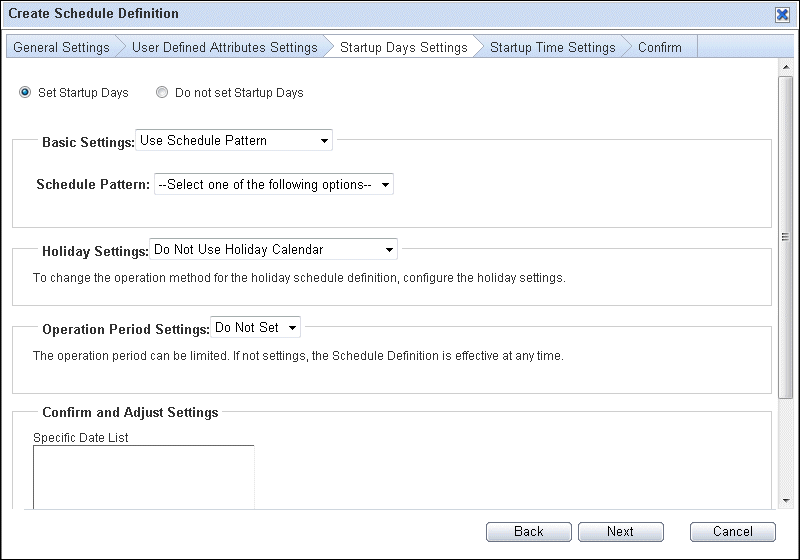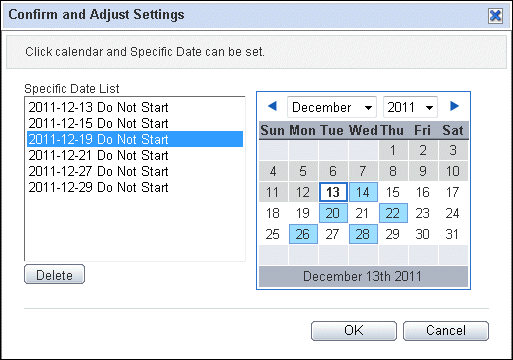Outline
The Create Schedule Definition Wizard (startup days settings) sets up the startup days of a Schedule Definition.
Calling sequence or built-in sequence
This wizard will be displayed when you click the Next button in the Create Schedule Definition Wizard (user defined attributes settings).

Select either Set startup days or Do not set startup days.
Select this option to automatically start the Automated Operation Process on the specified date.
Select this option to:
Display a list of main processes started manually (does not display subprocesses)
Define input parameters (UDA) before starting Automated Operation Processes manually
Additionally, if the startup days are not set, Do not set startup time is selected by default.
Select whether a Schedule Pattern that has been registered in the system is to be used. If so, select a Schedule Pattern from the drop-down list.
If a Schedule Pattern that has been registered in the system is not to be used, specify the items below to create a new Schedule Pattern:
Select a startup day type. You can select from the following types:
This sets every day as the startup day.
This sets a specific day of every week as the startup day. Select Sunday to Saturday from the checkbox.
This sets a specific day every month or a day of the week of a certain week of every month as the startup day. Click the Edit button and select the startup day from the Every Month setting window. When you select the Add button, the business day setting will be added to the list. The startup days below can be selected:
Date | Select a day in a range between 1st and 31st (days) from the drop-down list. |
End of Month | This sets the month end as the startup day. |
Day | Select the day of the week that using the following items: - Week: 1st to 5th (weeks) or last week - Day: Sunday to Saturday (day of the week) |
This sets a specific business day every month as the startup day. Click the Edit button and select the startup day from the Every Month(Business Day) setting window. A business day that has been selected from the drop-down list will be set as the startup day. When you select the Add button, the business day settings window will be displayed. Multiple business days can be added.
Month Settings | This sets the start date and end date of the fiscal month. A date that has been selected in a range between 1 and 28 (days) in the beginning of the fiscal month will be the start date. The end date will be automatically set as one day before the start date. |
Business Day Base | This sets a base for the first business day. Select either beginning of fiscal month or end of fiscal month. |
Business Day | This sets the business day. Select the business day from the drop-down list If the business day is the beginning of fiscal month Business Day: 1st to 28th business day If the business day is the end of fiscal month Business Day: 1 to 28 business days prior to month end |
This sets a specific date or a specific day of the week of every year as the startup day. Click the Edit button and select the startup day from the Every Year setting window. When you select the Add button, the business day setting will be added to the list. The items below can be specified:
Date | Select any month and day from the drop-down list: - Month: January to December - Day: 1 to 31 (days) |
Day | Select any day of the week according to the following items from the drop-down list: - Month: January to December - Day: Sunday to Saturday |
This specifies a holiday calendar that is to be used by the Schedule Definition.
This does not use the holiday calendar.
Select only one of the registered holiday calendars from the drop-down list.
Set the handling for when the startup day that has been set falls on a holiday in the holiday calendar.
Treatment
Select from the items below:
Do Not Start | The Schedule Definition will not operate. |
Shift to Previous Day | This shifts the startup day in the direction of the previous day. |
Shift to Next Day | This shifts the startup day in the direction of the next day. |
Number of Maximum Shifts
This sets a limit on the number of days on which a shift is to be performed if Shift to previous day or Shift to next day has been selected in Action. A value in a range between 1 and 99 (days) can be specified. If no number is specified no limit will be applied to the shifts. 0 cannot be used.
This uses a combination of multiple holiday calendars.
A list of the holiday calendars that can be used by a Schedule Definition will be displayed.
A list of the holiday calendars that are being used by Schedule Definitions will be displayed.
This sets the combination conditions for holidays where multiple holiday calendars have been selected:
- Make this day a holiday when all selected calendars have this day as a holiday (AND)
- Make this day a holiday when any of the selected calendars has this day as a holiday (OR)
This sets the handling for when the startup day that has been set falls on a holiday in the holiday calendar.
The items that are to be set are the same as for Use Holiday Calendar.
Operation Period Settings
This sets the period for which the Schedule Definition is to operate.
If no period is set, every day will be set as startup day starting from the today.
This sets the operation start date of the Schedule Definition. If a startup day is not specified, the startup day will be from this day. The start date cannot be a date in past.
This sets the operation end date of the Schedule Definition. If an end date is not specified, the operation period will be semi-permanent
Confirm and Adjust Settings
A calendar format can be used to check the startup days that have been set. Click the Confirm and Adjust Settings button and check the startup days.

The following parameters are displayed
Startup Day | Dates with blue background |
Holidays | Dates displayed by red numbers |
Dates outside Operation Period | Dates with hatched numbers |
Dates in past | Dates with a gray background |
This sets a day that is to have special handling in the Schedule Definition regardless of the Schedule Pattern or holiday settings.
To set a specific date, click on the date and add or remove startup day.